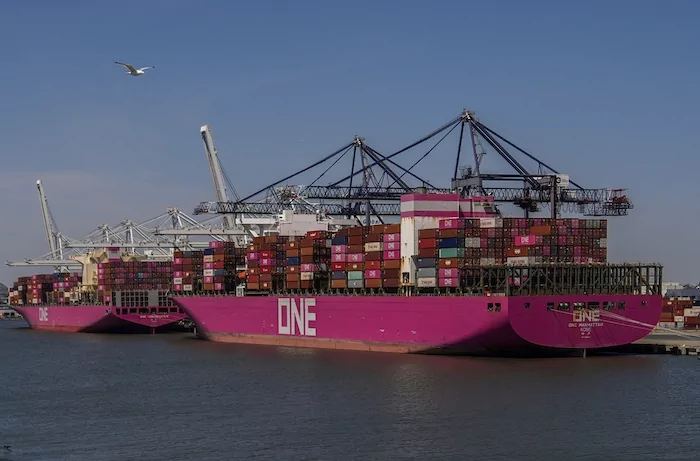Trump Tariffs Might Not Spark Inflation If Economy Weakens

The common belief is that the new tariffs imposed by President Donald Trump will increase prices and lead to inflation To increase, however, if the tariffs lead to a recession and individuals lose faith in the economic conditions, inflation might decline.
That situation differs from what is typically anticipated in the coming months. Usually, people expect tariffs to increase costs since they function like a consumer tax. At the border, when these duties are imposed, businesses frequently transfer this expense onto customers through elevated pricing. Given Trump’s actions imposing tariffs globally, there is broad consensus that prices might climb universally in the near future.
However, there’s an alternative viewpoint. If the economy suffers and consumers halt their spending, leading to decreased demand, prices generally decrease as well. Consequently, should Trump's tariff policies trigger economic decline or potentially push the nation into a recession, several economists suggest that inflation could actually subside.
Ryan Bourne, an economist from the Cato Institute, informed the Washington Examiner about the significant uncertainties caused by these tariffs. This ambiguity is affecting both investment decisions and consumer behavior. Consumers may reduce their spending as they become aware of the adverse impact these tariffs are expected to have on the economy.
"Is it absolutely guaranteed? No. However, I believe there's a considerable chance that general inflationary pressures could ease somewhat instead of causing a sudden surge in prices," Bourne noted.
In early April, a uniform 10% tariff rate was introduced for all U.S. trade allies, with significantly elevated tariffs applied to specific nations. Following substantial backlash from financial sectors, Trump withdrew the increased duties for a period of three months.
Individually, China stands out as the primary focus of Trump’s tariff policies, igniting concerns about a potential full-scale trade conflict. The interest rates set against Beijing escalated dramatically to 145%. Additionally, Trump has enforced tariffs on both Canada and Mexico due to issues concerning fentanyl and border safety. He has also introduced duties on various goods including steel, aluminum, and other commodities.
The Federal Reserve along with private-sector predictors have suggested that overall inflation may rise due to these tariffs. However, this assessment could shift if there’s a significant economic decline, a possibility that has emerged as the tariffs have affected consumer and investor confidence.
"It seems that without an early shift in this tariff policy, we might be moving towards a recession," said Desmond Lachman, a senior fellow at the American Enterprise Institute, to the Washington Examiner.
According to JPMorgan analysts, the probability of a worldwide economic downturn within the next year stands at 60%, assuming the tariffs continue. This figure has risen from 40% prior to Trump’s announcement regarding the tariffs. Similarly, Goldman Sachs has raised its forecasted likelihood of a recession from 20% to 45%.
A survey conducted monthly among over 300 CEOs belonging to the industry group Chief Executive revealed that 63% of them predicted a recession or another economic decline within the coming six months. This figure has risen from 48% in March who held the same view.
Even though these tariffs may cause prices to rise and potentially boost inflation over the medium term, the Federal Reserve should recognize that economic growth might slow down as well. According to Lachman, cutting interest rates would likely pose challenges for the Fed if inflation remains beyond their targeted levels.
So, the notion that inflation might decrease when a recession hits is probable," Lachman stated. "This would occur—especially if the recession were severe; then, inflation wouldn’t be an issue as it would drop.
However, in the near future, if agreements are not secured with other nations, especially with Beijing to reduce the 145% tariffs, Lachman cautioned that shoppers might quickly face bare shelves and increased costs at retail outlets.
As measured by the primary consumer price index under scrutiny, inflation has been declining during the initial phase of Trump’s presidency. The Federal Reserve aims for an inflation rate of 2%.
The Consumer Price Index dropped to 2.4% in March. Stripping out the unpredictable food and energy prices, core inflation reached its lowest point since 2021.
Consumer perceptions of inflation have surged dramatically, indicating that the majority believe prices will likely spike within the coming year.
The University of Michigan Consumer Sentiment Index for April, published on Friday, revealed that consumers' expectations regarding inflation over the next year rose from 5% last month to concerning 6.5% This month marks the highest figure since 1981, when the Great Inflation was gradually subsiding.
It should be remembered that at any time, Trump might reverse his stance on tariffs, offering respite to the markets and economy, or he could equally likely increase tariffs further or unveil another unexpected shift.
Another scenario is that of stagflation According to Stephen Kates, who works as a financial analyst at Bankrate.
Stagflation, combining "stagnation" with "inflation," occurs when prices increase but economic expansion and employment conditions struggle.
The term emerged in the 1970s during an economic downturn characterized by simultaneous high inflation and increasing unemployment rates. Prior to this period, prominent economists were of the opinion that such a scenario was not feasible. They instead posited that elevated inflation levels could potentially lead to reduced joblessness.
THE ECONOMIC METRICS THAT REMAIN ROBUST NOTWITHSTANDING THE TARiffs' Gloom
The immediate cause of the stagflation in the 1970s was the significant rise in oil prices during that era. According to Kates, this situation differs from the earlier oil shocks faced by the U.S., as these new tariffs represent issues "we've essentially created ourselves."
"Perhaps the most significant economic bogeyman at large is stagflation, characterized by decreasing demand alongside continuing price increases," Kates stated to the Washington Examiner.
0 Response to "Trump Tariffs Might Not Spark Inflation If Economy Weakens"
Post a Comment